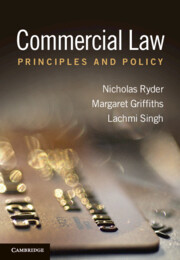Book contents
- Frontmatter
- Contents
- Preface
- List of abbreviations
- Table of Statutory Provisions
- Table of Cases
- Part 1 Agency
- Part 1 Chapter 1 Agency
- Part 1 Chapter 2 The Authority of an Agent
- Part 1 Chapter 3 Relations between a Principal and Agent
- Part 2 Sale of Goods and Services
- Part 3 International Trade and Sales
- Part 4 Tortious Liability for Defective Products
- Part 5 Unfair Commercial Practices
- Part 6 Banking and Finance Law
- Part 7 Consumer Credit
- Bibliography
- Index
- References
Part 1 Chapter 2 - The Authority of an Agent
from Part 1 - Agency
Published online by Cambridge University Press: 05 August 2012
- Frontmatter
- Contents
- Preface
- List of abbreviations
- Table of Statutory Provisions
- Table of Cases
- Part 1 Agency
- Part 1 Chapter 1 Agency
- Part 1 Chapter 2 The Authority of an Agent
- Part 1 Chapter 3 Relations between a Principal and Agent
- Part 2 Sale of Goods and Services
- Part 3 International Trade and Sales
- Part 4 Tortious Liability for Defective Products
- Part 5 Unfair Commercial Practices
- Part 6 Banking and Finance Law
- Part 7 Consumer Credit
- Bibliography
- Index
- References
Summary
Introduction
The purpose of Part 1 Chapter 2 is to provide a detailed commentary on the different types of authority that relate to an agency agreement, including actual authority.
The authority of an agent
Chapter 1 highlighted the problems associated with defining the terms ‘agent’ and ‘agency’. Somewhat unsurprisingly, the same problem arises with respect to the different categories of authority. Bradgate pointed out that ‘one of the great difficulties of the law of agency is that terminology is not used consistently’. For the purposes of this chapter, we will look at actual authority (both express and implied), apparent authority and usual authority.
Actual authority
The actual authority of an agency is granted by an agreement with the principal, which could be classified either as ‘implied’ or ‘express’ authority. This was a point famously referred to by Lord Denning MR in Hely-Hutchinson v. Brayhead Ltd:
actual authority may be express or implied. It is express when it is given by words, such as when a board of directors pass a resolution which authorises two of their number to sign cheques. It is implied when it is inferred from the conduct of the parties and the circumstances of the case, such as when the board of directors appoint one of their number to be managing director. They thereby impliedly authorise him to do all such things as fall within the usual scope of his office.
- Type
- Chapter
- Information
- Commercial LawPrinciples and Policy, pp. 14 - 27Publisher: Cambridge University PressPrint publication year: 2012



